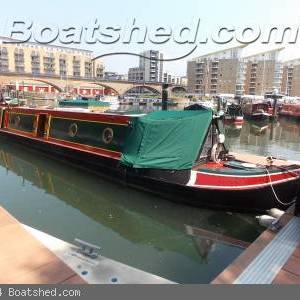
The Canal Lingo Secrets of Liveaboard Boaters
There’s nothing worse than confusing your windlass with your winding hole. The next time you’re cheesing your ropes, breasting up, blacking your bottom, opening the paddles, or shafting off, spare a thought for those non-boaters who don’t have a clue what you’re talking about. I asked my liveaboard Facebook friends if they had any favourite or peculiar words or phrases from the waterways and I was surprised to discover several that I’d never heard of! Which ones of these have you heard?
Gongoozled
Possibly the most wonderful sounding canal-related words are gongoozled, gongoozling and gongoozlers. A gongoozler is a bystander who enjoys standing beside a canal, watching the comings and goings of boats. Locks are particularlypopular for this spectator sport. (Did you see our guest post from Mark at Gongoozled?)
From the Old Days
Some terminology relating to parts of the boat and cabin date back to the days of cargo carrying on the canals, when the boat families had their own dialect. The ticket box is a drawer in the back cabin where the steerer would keep his orders, the coal ‘ole is self-explanatory and the bed ‘ole is where the cross-bed in the boatman’s cabin got folded away to during the day. The ellum is the traditional term for the steering apparatus, and was a mispronunciation of helm . ‘Taking a look’ meant to fall in to the canal, and the canal itself is still commonly known as ‘The Cut’ to this day.
What Boaters Do
You might say 'let her run' when you take the engine out of gear, and if you use a rope and post to halt the boat it’s called 'strapping'. If you need to change the direction of travel in a long narrowboat you’ll be looking for a wide part of the canal called a winding hole. Turning the boat in this way is pronounced "whin-ding"; not "wine-ding” because the wind can be used to assist the manoeuvre. If a crew member travels ahead by bicycle to set the locks in advance, this is known as lock-wheeling, and if you tidy your mooring ropes into a nice spiral at the end of the day this is known as ‘cheesing’. An unpowered boat is called a ‘butty’ (nothing to do with sandwiches!) and if you travel with your butty tied by the side of your motor, this is what’s known as ‘breasting up.’ A looby was the point on a butty or horsedrawn boat where the towing rope was attached, about a quarter way back from the bow.
Amy, from M.BWillow says,
“Some things vary by area. In the fens paddles are known as slackers or penstocks and on the Severn a narrowboat is a longboat, and what we call a cabin shaft on the canals is a hookshaft on the Severn.”
‘Blacking your bottom’ always raises a smile, but every canal boater knows this simply means having your hull painted with bitumen, to prevent corrosion. And finally, ‘turning a lock around’ means to set it in the other direction but do check that no other boats are coming from the opposite way before you set the lock in your own favour. Otherwise this would be known as ‘turning a lock in someone’s face’ - and is considered extremely rude!
Do you have any favourite or peculiar words or phrases? I'm fond of 'grease my stern gland' and 'pump my bilge'. If you come up with any others that sound a bit saucy, let us know on Twitter, using the hashtag #saucyboats.
Image: Narrowboat 57ft Trad for sale with London residential mooring.
Peggy
PS. Thanks to Corinne who came up with the idea for this article. Corinne is a virtual assistant and handles our Facebook and Twitter accounts.
You may also like:
Living on a Boat: The Boatshed Guide (free) / How to Sell a Boat: The Ultimate Guide (free eBook) / How to Buy a Boat: The Ultimate Guide / The best blog articles of 2013 / Don’t miss:The Boatshed Grand UnionDaily / A slideshow of our boat of the moment. / More articles.
New here? Come and say 'hello' on Facebookor Twitter:-)
Never miss an article: Sign up and get the latest blog articles sent directly to you, plus instantly receive our free eBook: How to Sell a Boat: The Ultimate Guide.

